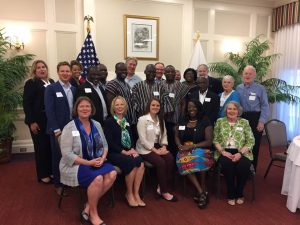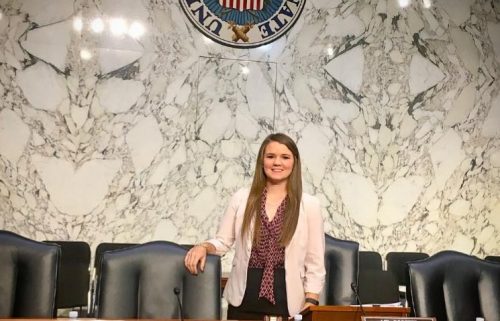 As I step into my Uber for my morning commute to work, I immediately recognize the accent of my driver, who is requesting my name. “Where are you from?”, I smile and ask. He proudly responded, “Ghana!” For the next twenty minutes, from Georgetown to Capitol Hill, we talked about our experiences in one of Africa’s greatest countries. With a huge grin on his face, he talked about how he missed “fufu” (Ghana’s most beloved meal), and was so happy I had experienced the love Ghana had to offer. He played Shatta Wale (famous Ghanaian artist) on the radio and weaved throughout traffic without losing a beat. It was like being back on a bumpy Ghanaian road in a taxi all over again and reminded me of what inspired me to come to Washington, D.C. in the first place.
As I step into my Uber for my morning commute to work, I immediately recognize the accent of my driver, who is requesting my name. “Where are you from?”, I smile and ask. He proudly responded, “Ghana!” For the next twenty minutes, from Georgetown to Capitol Hill, we talked about our experiences in one of Africa’s greatest countries. With a huge grin on his face, he talked about how he missed “fufu” (Ghana’s most beloved meal), and was so happy I had experienced the love Ghana had to offer. He played Shatta Wale (famous Ghanaian artist) on the radio and weaved throughout traffic without losing a beat. It was like being back on a bumpy Ghanaian road in a taxi all over again and reminded me of what inspired me to come to Washington, D.C. in the first place.
 As an AgriCorps Fellow in Gbuluhagu, Ghana, I spent most of my days with farmers and youth interested in agriculture. These days were usually long, hot, and filled with strategizing how to overcome a challenge with the farm.
As an AgriCorps Fellow in Gbuluhagu, Ghana, I spent most of my days with farmers and youth interested in agriculture. These days were usually long, hot, and filled with strategizing how to overcome a challenge with the farm.
The issues:
• Not enough money.
• Too hot.
• Nutrient deficiencies.
• Not enough rain.
• An insect harming the reproduction process.
• A weed starving a plant from its nutrients.
Sound familiar?
All of these issues are the exact same as what American farmers face every growing season. So, why is Ghanaian agriculture struggling so much when they face the same problems American farmers do? There is no simple answer. Developing countries are extraordinarily complex, but a major key to American agriculture being the best agricultural nation in the world is our government support.
 America was literally born on agriculture. It’s a major reason people migrated here, transportation took off to move agriculture goods, and it generated our exports; which boomed our economy. For most people in America, farming was just a way of life; but Abraham Lincoln recognized agriculture’s high importance, and in 1862 established the United States Department of Agriculture. About 25 years later, the Hatch Act was passed to provide federal funding to agricultural experiment stations; which generated new technology that improved production. And in 1914, the Smith-Lever Act was established to fund cooperative extension services in every county of every state to teach agriculture to the public. These efforts to improve agriculture were just the beginning of much more policy put in place to improve American agriculture. Unfortunately, Ghana lacks policy and the government support it needs to assist farmers in reaching their full potential and to eradicate hunger in their country.
America was literally born on agriculture. It’s a major reason people migrated here, transportation took off to move agriculture goods, and it generated our exports; which boomed our economy. For most people in America, farming was just a way of life; but Abraham Lincoln recognized agriculture’s high importance, and in 1862 established the United States Department of Agriculture. About 25 years later, the Hatch Act was passed to provide federal funding to agricultural experiment stations; which generated new technology that improved production. And in 1914, the Smith-Lever Act was established to fund cooperative extension services in every county of every state to teach agriculture to the public. These efforts to improve agriculture were just the beginning of much more policy put in place to improve American agriculture. Unfortunately, Ghana lacks policy and the government support it needs to assist farmers in reaching their full potential and to eradicate hunger in their country.
The saying, “you don’t know how great it is until it’s gone”, hit me many times in Ghana, but when I realized the enormous industries, agencies, and organizations that kept American agriculture thriving, it opened a whole new meaning. In Ghana, there are no subsidies, safety nets, or newly developed technologies invested in by the government. There is no Crop Production Services to sell you the seed and chemicals of your choice; no American Farm Bureau Federation to advocate on your behalf, and no Farmer’s Bank to loan you money for your inputs. It’s just you, your farm, and the willingness of the good Lord. With the limited resources Ghanaian farmers have, it makes the issues listed above nearly impossible to overcome.
However, the term “nearly impossible” is key. Despite the lack of resources, Ghanaian farmers still find ways to succeed. I learned so much from their innovations and learned to appreciate the organizations and policy American farmers rely on to reach their full potential.
 My initial interest in agriculture policy that began in Ghana has led me to intern with the United States Senate Committee on Agriculture, Nutrition, and Forestry in Washington, D.C.; in order to learn more about how federal government creates policies to improve agriculture globally. Since being an intern for the Senate Ag Committee, I have had the opportunity to attend Hearings over the 2018 Farm Bill, learn from Legislative Assistants who focus on international agriculture and network with agriculture professionals from around the world. It has been a great experience to first-hand see how hard our federal government works to improve agriculture, and hopefully one day my Ghanaian taxi driver will be able to say agriculture in his country has improved, as well.
My initial interest in agriculture policy that began in Ghana has led me to intern with the United States Senate Committee on Agriculture, Nutrition, and Forestry in Washington, D.C.; in order to learn more about how federal government creates policies to improve agriculture globally. Since being an intern for the Senate Ag Committee, I have had the opportunity to attend Hearings over the 2018 Farm Bill, learn from Legislative Assistants who focus on international agriculture and network with agriculture professionals from around the world. It has been a great experience to first-hand see how hard our federal government works to improve agriculture, and hopefully one day my Ghanaian taxi driver will be able to say agriculture in his country has improved, as well.


